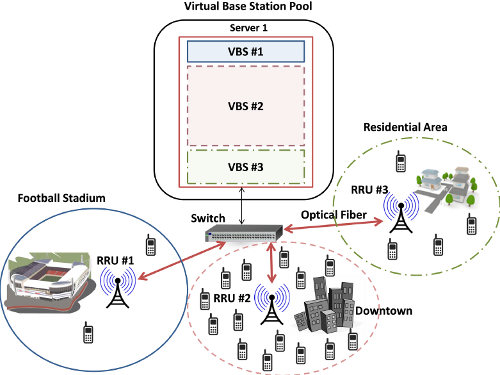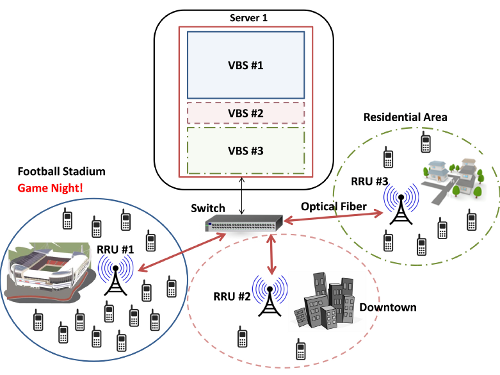Professor Dario Pompili received a 3-year NSF NeTS grant of $400,000 for the project "Demand-aware Dynamic Virtual Base Station Provisioning and Allocation in Cloud Radio Access Networks (C-RANs).
The project abstract is shown below.
Demand-aware Dynamic Virtual Base Station Provisioning and Allocation in Cloud Radio Access Networks (C-RANs)
PI: Prof. Dario Pompili, Dept. of Electrical and Computer Engineering, Rutgers University
The proliferation of personal mobile computing devices along with a plethora of data-intensive mobile applications has resulted in a tremendous increase in demand for ubiquitous and high-data-rate wireless communications over the last few years. Additional deployment and maintenance of a large number of stand-alone cellular Base Stations (BSs) to meet the growing capacity demand are highly inefficient due to excessive capital and operating expenditures. Presently, multiple Radio Access Networks (RANs), each composed of geographically proximal BSs, are statically configured and deployed; such an approach, however, does not allow for any margin to handling the fluctuations in capacity demands due to the ever transforming mobile applications landscape and unexpected events such as emergencies. Cloud-RAN (C-RAN), composed of Remote Radio Units (RRUs) distributed over a wide geographic region controlled by remote Virtual Base Stations (VBSs) housed in centralized BS pools, is a new paradigm for broadband wireless access to address the fluctuation in capacity demand efficiently.
This research focuses on designing a dynamic reconfigurable cellular communication system that relies on elastic VBSs, which can be dynamically resized to meet the fluctuations in per-user capacity demands. This elasticity enables improvements in user Quality of Service (QoS) and efficiency in energy and computing resource utilization in C-RANs. However, Virtual Machine (VM) provisioning, i.e., determining the "size" of VMs that hold VBSs, as well as appropriate allocation of VMs to physical servers are non-trivial challenges. The tasks of this project consist in the design and development of (i) a demand-aware dynamic VM provisioning algorithm that relies on an offline profiling of the computational complexity and memory footprint of the communication functionalities implemented in software; (ii) a QoS-aware VM allocation algorithm that exploits VBS co-location models; (iii) a C-RAN testbed on virtualized enterprise-class servers for validation of the profiling and allocation solutions through emulation campaigns.
This work will generate computer-literate undergraduate and graduate researchers with a comprehensive knowledge of energy-efficient design and management of computing resources for futuristic C-RANs. The PI will create new teaching modules on elastic resource allocation, provide opportunities for exchange programs, leverage existing minority student outreach networks at Rutgers University, and incorporate student exchange programs.


Virtualization allows for re-provisioning of spectral and computing resources to Virtual Base Stations (VBSs) (e.g., different VBS sizes) based on demand fluctuation; (a) and (b) illustrate the daily movement of mobile network load from the downtown office area to the residential and recreational areas.
